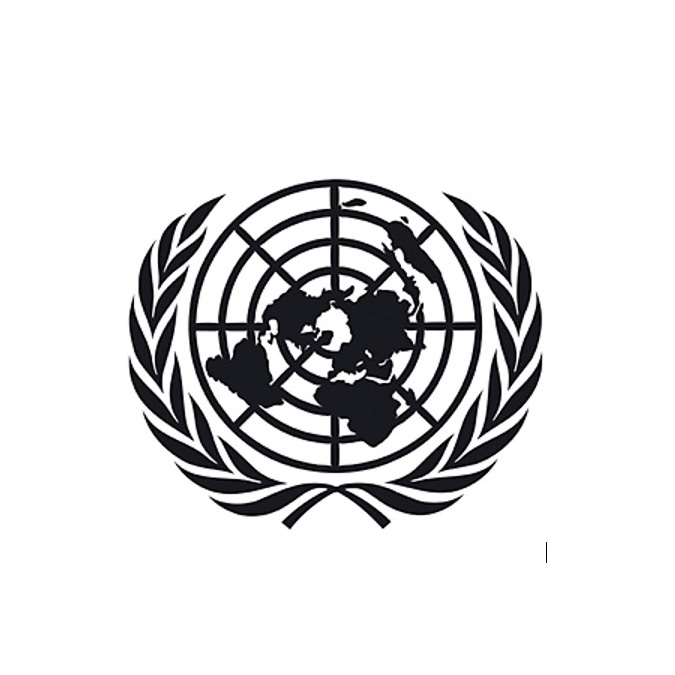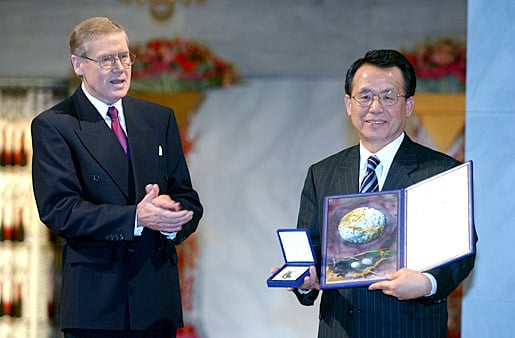United Nations
Speed read
The United Nations was awarded the Nobel Peace Prize, jointly with Kofi Annan, for their work for a better organised and more peaceful world.

Full name: United Nations (UN)
Native name: United Nations
Founded: 1945, New York, NY, USA
Date awarded: 12 October 2001
Promoting multilateralism and safeguarding world peace
Throughout its history, the Norwegian Nobel Committee has supported organised cooperation between nations. Therefore, it was not unexpected when the committee divided the Nobel Peace Prize between the UN and UN Secretary-General Kofi Annan in 2001, the centennial anniversary of the prize. Up to that date, the committee had honoured 13 laureates affiliated with the UN. In 1945, the UN replaced the League of Nations as a forum for ensuring world peace. Differences between the major powers prevented the establishment of a military force that could intervene when peace was broken. Instead, the organisation concentrated its efforts on eradicating poverty and promoting economic and social development. After 1970, human rights issues steadily gained importance within the UN.
"Over the hundred years that have passed since the first Peace Prize was awarded in 1901, the foremost sustained intention of the Norwegian Nobel Committee has been precisely that: of strengthening international co-operation between states."
Gunnar Berge, Presentation Speech, 10 December 2001.

"Securing real and lasting improvement in the lives of individual men and women is the measure of all we do at the United Nations."
- Kofi Annan, Nobel Prize lecture, 10 December 2001.
UN human rights efforts
The 1948 Universal Declaration of Human Rights encompassed political and civil rights. Its scope was extended in 1966 with one covenant on political and civil rights and another on economic, social and cultural rights. In the 1980s, additional human rights legislation was introduced to safeguard the right to live in a sustainable society in ecological balance. The UN has also ratified conventions on women’s and children’s rights. This development clearly shows that the UN is becoming more concerned with conditions within nations than with relations between nations.
| Human rights Rights that apply to all persons regardless of gender, race, ethnicity, religious affiliation or nationality. The most important are the rights enshrined in the UN Declaration of Human Rights, adopted in 1948. |
| Ecology From the Greek oikos meaning house and logos meaning teaching. Environmental thinking. Knowledge of how processes in nature are interrelated and what the consequences will be if these processes are changed. |
UN reform efforts
In 2005, the UN dealt with a number of recommendations for the revitalisation of the organisation. In addition to restructuring the Security Council, there were calls for increased focus on efforts to combat poverty, pollution and the spread of infectious disease. Other priorities included implementing measures to stop the proliferation of weapons of mass destruction and international crime. There was also a demand that the war on terrorism be conducted with respect for human rights and international law.
| UN Security Council The only UN body empowered to take military action. Member states are under obligation to follow the Council’s resolutions. The Council has 15 members. The five permanent members – the USA, Russia, China, the United Kingdom and France – have veto rights. |
| Weapons of mass destruction Nuclear, chemical and biological weapons that can exterminate large human populations in a short amount of time. |
"The founding Charter of the United Nations talked of ‘the scourge of war.’ The task of finding ways to put an end to that scourge is as vital today as it was in 1945."
James Robbins, BBC News, 22 December 2001.
Disclaimer: Every effort has been made by the publisher to credit organisations and individuals with regard to the supply of photographs. Please notify the publishers regarding corrections.
Nobel Prizes and laureates
Six prizes were awarded for achievements that have conferred the greatest benefit to humankind. The 14 laureates' work and discoveries range from quantum tunnelling to promoting democratic rights.
See them all presented here.
